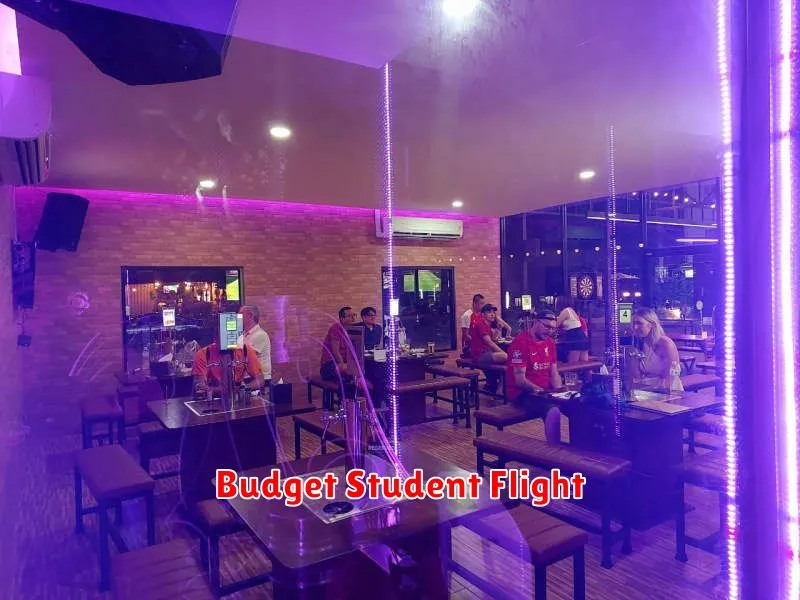Traveling on a student budget can feel like an impossible dream, but it doesn’t have to be! With a little planning and some savvy strategies, you can find budget flights that won’t break the bank. Whether you’re planning a weekend getaway, a spring break adventure, or a summer backpacking trip, there are plenty of ways to soar through the skies without emptying your wallet.
This article will guide you through the world of affordable airfare, uncovering the best tips and tricks for securing cheap flights. From understanding the complexities of flight booking websites to exploring hidden gems in the world of budget airlines, we’ll equip you with the knowledge to become a pro at finding the most affordable way to reach your travel destination. So buckle up, students, it’s time to take flight!
The Ultimate Guide to Student Flight Deals
Being a student means you’re constantly on the lookout for ways to save money. And when it comes to travel, finding cheap flights is essential. But with so many different airlines and websites to choose from, it can be overwhelming to know where to start. That’s where this guide comes in. We’ll cover the top tips and tricks for snagging the best student flight deals, so you can explore the world without breaking the bank.
1. Be Flexible with Your Dates: One of the most important things to remember when searching for cheap flights is to be flexible with your dates. Flying on weekdays or during off-peak seasons can save you a lot of money. Consider traveling during the shoulder seasons (spring and fall) or even during the summer holidays, as these times tend to be less crowded and more affordable.
2. Consider Low-Cost Carriers: Low-cost carriers, such as Ryanair, EasyJet, and Norwegian, often offer significantly cheaper flights than traditional airlines. Keep in mind that these airlines may have additional fees for baggage, seat selection, and meals, so factor those into your budget. However, if you’re a light traveler and willing to pack strategically, these airlines can be a fantastic option.
3. Utilize Student Discount Programs: Some airlines offer student discounts on their flights. These programs usually require you to verify your student status with a valid student ID. Check the airline’s website or contact their customer service to see if they offer student discounts.
4. Use Flight Search Engines: Many flight search engines can help you compare prices from different airlines and find the best deals. Some popular options include Google Flights, Skyscanner, and Kayak. Set up price alerts to be notified when the price of your desired flight drops.
5. Look for Connecting Flights: While direct flights can be convenient, they often come at a higher price. Consider taking connecting flights, as they can often be more affordable. Remember to factor in the extra travel time for the connection.
6. Sign Up for Airline Newsletters: Sign up for newsletters from airlines you frequently fly with. They often send out exclusive deals and promotions to their subscribers, including discounted flights for students.
7. Consider Using a Travel Agent: While they may charge a fee, a travel agent can be a valuable resource for finding cheap flights. They have access to a wider range of deals and can help you find the best options for your needs.
8. Book in Advance: In most cases, booking your flights in advance can help you secure better prices. Airlines often release their flight schedules several months in advance, so booking early can give you the best chance of getting a good deal.
9. Be Aware of Fees: Always read the fine print and be aware of any additional fees, such as baggage fees, seat selection fees, and cancellation fees. These can add up quickly, so factor them into your budget.
10. Be Flexible with Your Destination: If you’re open to exploring different destinations, you’re more likely to find great flight deals. Consider flying to nearby cities or exploring different regions within your chosen country.
Timing is Key: Booking Flights for Maximum Savings
The flight booking process can be a minefield, but understanding the secrets to finding budget-friendly fares is crucial for students with limited funds. One major factor influencing airfare is timing, and savvy travelers can leverage this knowledge to their advantage.
Booking in advance is often the key to securing lower fares. Airlines release their lowest prices weeks, even months, in advance, so acting early can save you significant money. However, don’t wait until the last minute, as prices often spike as departure dates approach. Aim to book your flights at least 2-3 months in advance for the best deals.
Weekday vs. Weekend: Flights generally tend to be cheaper on weekdays, especially Tuesdays and Wednesdays. Weekends and holidays are peak travel times, so expect to pay more. If your schedule allows, consider flying on a weekday to potentially save a few bucks.
Off-Season Travel: School breaks and holidays mean higher prices. By traveling during the off-season, you can enjoy cheaper flights, quieter airports, and sometimes even better deals on accommodation.
Avoid Peak Hours: Flights departing during peak hours, such as early mornings and late evenings, often cost more. Look for flights departing mid-morning or afternoon for possible savings.
By mastering the art of timing, you can find significantly cheaper flight options and maximize your budget for other travel adventures. So, plan ahead, be flexible, and happy travels!
Flexibility is Your Friend: Embracing Alternative Airports and Routes
When it comes to securing budget flights, flexibility is your best friend. Don’t be afraid to consider alternative airports and routes. Often, flying into a smaller, less popular airport can mean significantly lower fares. For instance, instead of flying directly into London Heathrow, consider landing at Gatwick or Stansted. These airports might require a short train or bus ride to your final destination, but the savings could be substantial.
Think about your travel dates as well. Traveling during off-peak seasons or on weekdays can often result in cheaper flights. If your schedule is flexible, you could explore options like flying on a Tuesday or Wednesday instead of a Friday or Sunday. Remember, being open to alternative airports and dates will greatly increase your chances of finding those coveted budget flights!
Unlocking Student Discounts and Promo Codes

It’s no secret that students are on a budget, and that includes travel. Luckily, airlines and travel companies often offer student discounts and promo codes to help make those much-needed adventures more affordable.
To unlock these savings, start by checking the airline’s website directly. Many airlines have dedicated student sections on their websites where you can find exclusive deals. Also, consider joining the airline’s loyalty program as these often offer student-specific perks.
Don’t forget about travel agents! Some travel agents specialize in student travel and can offer you great deals on flights and accommodation. And, always remember to check for student discount websites, which are dedicated to finding and aggregating student discounts across a wide range of products and services, including travel.
By taking advantage of student discounts and promo codes, you can keep your travel costs down and focus your budget on enjoying your journey!
The Power of Comparison: Utilizing Flight Search Engines Effectively
Navigating the vast world of air travel can be daunting, especially for students on a tight budget. Thankfully, flight search engines have become indispensable tools for finding the best deals. These platforms allow you to compare prices from multiple airlines and travel agents, saving you time and money.
The key to maximizing your savings lies in understanding how to utilize these engines effectively. Start by being flexible with your travel dates. Prices can fluctuate wildly depending on the day of the week and time of year. Experiment with different dates to see if you can find a more affordable option.
Another crucial tip is to explore different airports. Often, flying into a smaller, less popular airport can significantly lower your costs. Be sure to check the distance from the airport to your final destination and factor in any transportation costs.
Don’t forget to utilize advanced filtering options. Most flight search engines offer features like filtering by airline, number of stops, and even baggage allowance. This allows you to tailor your search to your specific needs and preferences.
Finally, sign up for email alerts from your preferred search engines. This will notify you of any price drops or special deals on your desired routes, ensuring you don’t miss out on a great opportunity.
By mastering the art of comparison and utilizing the full potential of flight search engines, you can unlock a world of affordable travel opportunities.
Exploring Budget Airlines: Weighing the Pros and Cons
Budget airlines have revolutionized travel, making it more accessible to those on a tight budget. But with their low fares come certain trade-offs. Here’s a breakdown of the key pros and cons to consider when choosing a budget airline:
Pros:
- Lower Fares: This is the most obvious advantage. Budget airlines often offer significantly cheaper fares compared to traditional airlines, especially for short-haul flights.
- More Frequent Flights: Due to their focus on high volume, budget airlines often operate more frequent flights, providing travelers with greater flexibility.
- Online Booking Convenience: Most budget airlines have user-friendly websites and mobile apps for easy online booking, saving time and effort.
Cons:
- Limited Amenities: Budget airlines usually offer minimal amenities, such as no free checked baggage, in-flight meals, or entertainment systems.
- Hidden Fees: Be mindful of potential extra charges for baggage, seat selection, meals, and even carry-on bags.
- Smaller Seats and Limited Legroom: To keep costs low, budget airlines often have smaller seats with less legroom, making long flights less comfortable.
- Potential Delays and Cancellations: Budget airlines may face operational challenges that could lead to flight disruptions.
Weighing the Trade-offs:
Ultimately, the decision to fly with a budget airline depends on your individual needs and priorities. If affordability is your primary concern and you’re comfortable with the potential downsides, budget airlines can offer a great option. However, if you value comfort, convenience, and peace of mind, a traditional airline may be a better choice.
Packing Light: Avoiding Baggage Fees and Traveling Smart
As a student, budget travel is essential, and baggage fees can quickly eat into your savings. Packing light is a crucial part of keeping costs down and making sure your travel experience is smooth and stress-free.
Here are some key tips to help you travel smart:
- Choose a carry-on backpack or suitcase: This will avoid checked baggage fees altogether. Many airlines offer generous carry-on allowances, so make sure you research yours before packing.
- Pack versatile clothing: Opt for items that can be mixed and matched, like neutral-colored t-shirts, pants, and a lightweight jacket. Avoid bringing lots of shoes and accessories.
- Roll, don’t fold: Rolling your clothes creates more space and helps prevent wrinkles. Consider packing cubes to further organize your belongings.
- Use travel-sized toiletries: These are often available at airports and travel stores, so you don’t have to lug around bulky bottles.
- Consider a digital travel journal: Leave the heavy guidebook at home and download a travel app or use your phone for researching activities and attractions.
- Weigh your luggage beforehand: It’s better to be safe than sorry, and you don’t want to be hit with unexpected fees at the airport.
By following these tips, you can conquer the art of packing light and avoid those pesky baggage fees. Not only will this save you money, but it will also make your travels more enjoyable by simplifying your journey.
Making the Most of Layovers: Exploring New Cities on a Budget

Layovers can be a hassle, but they also present a fantastic opportunity to explore a new city without breaking the bank. With a little planning, you can turn a stopover into a mini-adventure and add a new destination to your travel list. Here are some tips on making the most of your layovers and exploring new cities on a budget:
Choose the Right Layover Length: Aim for a layover of at least 6-8 hours to give you enough time to explore without feeling rushed. Avoid layovers that are too short, as you might not have enough time to get through customs and security and reach your destination within the city.
Prioritize Proximity: Select a flight with a layover at an airport close to the city center or a location with convenient transportation links. This will help you maximize your time and avoid spending a significant portion of your layover on travel.
Research and Plan Ahead: Research popular attractions and create a quick itinerary beforehand. Prioritize activities that are close together to optimize your exploration time. Remember, this is a quick visit, so focus on the highlights.
Embrace Public Transportation: Public transport is often the most affordable and efficient way to get around a city. Check out local transportation options such as buses, trains, or trams. Many cities offer day passes or tourist cards for economical travel.
Seek Out Free Attractions: Many cities offer free or low-cost attractions such as parks, museums, walking tours, and historical landmarks. Utilize websites like TripAdvisor or Lonely Planet to find free walking tours or local events happening during your layover.
Pack Light and Smart: Travel light, bringing only essentials and comfortable shoes for walking. Consider a carry-on backpack to save on baggage fees and move around effortlessly.
Take Advantage of Airport Amenities: Utilize airport facilities to your advantage. Many airports offer free Wi-Fi, comfortable seating areas, and even showers for travelers. You can also enjoy a quick meal or grab a coffee at the airport restaurants.
Enjoy the Local Cuisine: Indulge in the local street food or try a casual restaurant for an authentic taste of the city. Local markets and food stalls often offer inexpensive and delicious meals.
Embrace the Unexpected: Be open to spontaneous adventures and enjoy the unexpected discoveries that come with exploring a new city. Sometimes, the best moments are the ones you least expect. Embrace the journey and create lasting memories.
Traveling During Off-Peak Seasons: Finding Hidden Gems
While everyone else is busy chasing the sun during peak season, you can find some truly hidden gems by venturing out during the off-peak seasons. Think shoulder seasons like spring and fall, or even the winter months for destinations with milder climates. Traveling during these times offers numerous benefits, including lower flight prices, smaller crowds, and a more authentic travel experience.
During off-peak seasons, airlines often offer significant discounts on flights to attract travelers. You’ll find yourself with more flexibility when booking accommodations, as hotels and guesthouses tend to have lower rates and availability. Fewer crowds mean shorter lines at attractions, more intimate experiences, and a chance to fully immerse yourself in the local culture without the hustle and bustle.
Traveling during off-peak seasons can be a great way to save money and discover unique experiences that you might miss during peak season. So, consider exploring the world beyond the usual tourist rush and uncover some hidden gems on your next adventure.
Staying Connected: Affordable International Roaming Options
Staying connected while abroad is essential, especially for students who rely on communication for schoolwork, emergencies, and keeping in touch with loved ones. However, international roaming charges can quickly drain your budget. Fortunately, there are several affordable options to ensure you can stay connected without breaking the bank.
Prepaid SIM Cards: A popular choice, prepaid SIM cards offer data, calls, and texts at a fixed rate. These cards are readily available at airports and convenience stores in many countries. The cost of these cards varies depending on the carrier and plan, so it’s essential to research the best option for your destination.
eSIMs: Similar to prepaid SIM cards, eSIMs are digital SIMs that can be activated directly on your phone. They offer flexibility and convenience, allowing you to switch between different carriers without needing a physical SIM card. Several companies offer eSIM plans specifically for international travelers.
Travel Roaming Pass: If you need to make calls and send texts, your existing carrier might offer travel roaming passes for a specific amount of data or minutes. These passes can be convenient if you only need occasional connectivity or if you’re traveling for a short duration.
Wi-Fi Hotspots: Free Wi-Fi is available in many public areas such as airports, hotels, cafes, and restaurants. You can also purchase a portable Wi-Fi hotspot that lets you create a personal Wi-Fi network, offering a reliable connection on the go.
Consider your needs and budget when choosing an international roaming option. If you only need occasional data access for social media and emails, a prepaid SIM card might be the best choice. For heavy data usage, eSIMs or travel roaming passes might be more suitable. Remember to research and compare prices to find the most cost-effective option.
Essential Tips for a Smooth and Budget-Friendly Flight Experience

Navigating air travel on a student budget can be a daunting task, but with a few smart strategies, you can soar through the skies without breaking the bank. Here are some essential tips for a smooth and budget-friendly flight experience:
Be flexible with your dates and destinations. Flying during off-peak seasons and weekdays can save you a significant amount of money. Consider exploring alternative airports near your destination, as they may offer cheaper fares.
Embrace budget airlines. While these airlines might have limited amenities, they often offer incredibly low fares. Factor in any additional fees for baggage or seat selection, and be prepared for a no-frills experience.
Book in advance. Planning ahead and booking flights well in advance, especially during peak seasons, can secure better deals and prevent last-minute price hikes.
Pack light. Avoid checked baggage fees by packing strategically. Utilize travel-sized toiletries and pack only essential clothing. Consider using a carry-on backpack or suitcase that meets airline restrictions.
Compare prices and use travel search engines. Take advantage of online platforms that compare prices across multiple airlines and travel agents. Utilize tools like Google Flights or Skyscanner to find the best deals.
Sign up for airline newsletters and loyalty programs. By subscribing to airline newsletters, you’ll be notified about special offers and promotions. Enrolling in loyalty programs can earn you points or miles that can be redeemed for future flights.
Consider travel insurance. While not always required, travel insurance can provide financial protection against unexpected events such as flight delays, cancellations, or medical emergencies.

